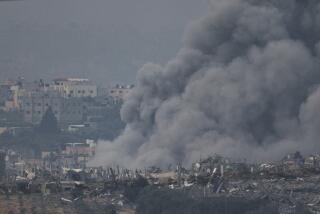Hussein in a ‘Straitjacket,’ Clinton Asserts
WASHINGTON — President Clinton declared Saturday that the United States has “tightened the strategic straitjacket” around Iraqi President Saddam Hussein, even as senior American officials pressed a diplomatic offensive to rally support behind U.S. policy and leadership in the Persian Gulf.
A day after the Clinton administration announced that it will send 5,000 Army troops to Kuwait to underscore U.S. warnings to Iraq, Defense Secretary William J. Perry arrived in Saudi Arabia on Saturday on the first leg of a Gulf swing, and Clinton talked by telephone with Saudi King Fahd.
Both the president’s 10-minute conversation and Perry’s visit are part of the administration’s effort to relay its views on long-term strategy for Gulf stability, a White House official said.
But it was unclear whether the administration is prepared to move back from the fight of clash with Hussein or whether further punitive measures against Baghdad are virtually inevitable--as U.S. officials had made it appear last week.
The escalating crisis stalled late Friday when Iraq issued an ambiguous pledge not to target U.S. warplanes in “no-fly” zones in the north and south of the country.
*
Clinton said in his weekly radio address Saturday that the United States had no choice in its recent military actions against Baghdad, and administration officials left open the possibility of further strikes.
“For the past five years, Saddam Hussein has repeatedly threatened the stability of the Persian Gulf and our allies. . . . If we had failed to answer Saddam’s provocation, he would have been emboldened to act even more recklessly and in a manner more dangerous to our interests,” Clinton said.
“America’s vital interests in the Persian Gulf are constant and clear: to help protect our friends in the region against aggression; to work with others in the fight against terrorism; to preserve the free flow of oil; and to build support for a comprehensive Middle East peace,” he said.
U.S. moves over the past two weeks have made it more difficult for Hussein to threaten Saudi Arabia and Kuwait, Clinton said.
After two weeks of escalating tension with allies abroad and political rivals at home over Iraq strategy, the administration has, at least momentarily, stepped back to deal with both. It hopes to win either their support or silence before taking further action, administration sources said.
The decibel level in the noisy war of words between Washington and Baghdad also decreased Saturday as Iraq expressed “concern” about the crisis.
Heralding Baghdad’s offer of a new dialogue, the newspaper Al Jumhuriyah said, “The decision is further evidence of Iraq’s concern about avoiding tension and its belief that dialogue is the only way to solve problems.” Front-page editorials in state-controlled papers usually speak for the government.
The paper noted that the “temporary” offer was designed to “strip America of excuses and pretexts to commit a new crime.”
The gesture, however, was all but dismissed by the White House.
“We treat words somewhat skeptically given the pattern of honesty in the past,” spokesman David Johnson said Saturday. “We continue to believe that the way to solve the problem is for Saddam to abide by all U.N. resolutions.”
With the dispatch of additional warplanes, ships and troops to the Gulf region in recent days, the president indicated, the United States will be strong enough to contain any Iraqi aggression.
“The United States will take whatever steps are necessary to protect our pilots as they enforce the expanded ‘no-fly’ zone and to defend our strategic interests,” the president said, referring to the enlarged southern zone.
Eight F-117A stealth fighters arrived Friday in Kuwait, while the 5,000 Army troops from Ft. Hood, Texas, are expected to leave as early as this weekend for the tiny sheikdom. The aircraft carrier Enterprise is expected to reach the Gulf today from the Mediterranean. And B-52 bombers, which were involved in the first U.S. airstrike two weeks ago, have been moved to a British base on the Indian Ocean island of Diego Garcia, within striking distance of Iraq.
*
The difficulty the U.S. diplomatic effort faces was reflected at an Arab League summit of foreign ministers in Cairo on Saturday. The ministers called for “restraint” in dealing with the crisis and “respect” for Iraq’s territorial integrity.
One of several reasons traditional allies did not embrace U.S. retaliation was because of issues of sovereignty. Unlike Iraq’s invasion of Kuwait in 1990, its attack on Kurdish enclaves Aug. 31 involved its own territory.
Baghdad has now effectively reunified a major part of Iraq with the rest of the country.
“We are the people most committed to the coherence of Iraq,” said Sheik Sabah al Ahmed al Jabbar al Sabah, the Kuwaiti foreign minister. “We cannot accept the partition of Iraq.”
More to Read
Sign up for Essential California
The most important California stories and recommendations in your inbox every morning.
You may occasionally receive promotional content from the Los Angeles Times.










